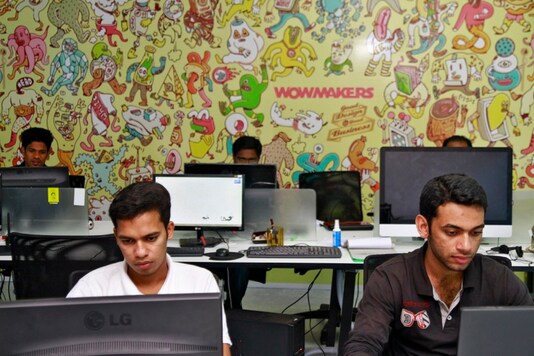Is this a good time to start a business? This question may have been asked many times over and over again, but at a time when the Coronavirus pandemic doesn’t seem like it’s going anywhere, it has perhaps become the question no one wants to really ask.
Adeo Ressi, co-founder and CEO of Founder Institute, explains why this may indeed be a good time to start that business. In fact, Founder Institute, the world’s largest pre-seed incubator, was founded in 2009, during the global financial crisis. Back in India, as Ressi pointed out, that some of the most successful businesses-- Zomato, Policy Bazaar and Icertis were also founded at the same time.
India was already facing an employment crisis. The pandemic has made it worse. The move to a digital space with little or no concept of office space coupled with increasing thrust on automation have also rendered many unemployable. Do you think jobs will be the biggest challenge for the youth? How do you think we can overcome the challenge of rising unemployment?
Employment in India remains a big challenge as the country’s economic growth continues to outpace job creation. I believe that India should tackle this problem on two fronts:
First, investing in education to prepare India’s youth for the new labor roles brought on by the so-called Fourth Industrial Revolution. While India made huge strides to educate its population in order to keep up with demand from the IT sector, the nature of fast-evolving technologies means that not just India but the whole world will have to relearn and re-skill within the coming years. According to IBM, 120 million workers in the world’s largest economies will have to retrain/reskill for AI in the coming years.
Second, India should lower the barriers to entrepreneurship and incentivize small and medium businesses with growing teams. Studies show that by creating new products and increasing competition, entrepreneurs provide new job opportunities in the short and long term.
The latest figures from Startup India show that there were around 50,000 startups in the country in 2018 -- about 9,300 of these were technology-based startups, and according to NASSCOM, tech startups created 60,000 direct jobs in 2019.
In order for India to make a meaningful dent in unemployment figures, the country must drastically increase the amount of new companies being founded, especially SMBs that are hiring more than six employees. To do this, India must:
-Lower the barrier to entry by relaxing compliances and fiscal policy for startups. For example, the Indian government’s recent move to remove the so-called ‘angel tax’ burden from startups who received angel investment is a good start and should be built upon.
-Re-classify small and medium-sized businesses based on number of employees rather than on amount of investment and provide incentives for startups to sustainably grow their teams. Countries like the United States and United Kingdom classify small and medium-sized businesses by the number of people the business employs and revenue. In India, the classification of a company’s size is defined in terms of investment in machinery or equipment. This classification is antiquated and can affect policy which could actually inhibit job growth. Startups in India should instead be incentivized to sustainably grow their teams and create more jobs.
-India should also facilitate procurement of Indian startups’ products and services domestically -- perhaps via a marketplace like NASSCOM has suggested in the past -- as well as creating a network to help Indian startups soft-land in foreign markets.
-And finally, India must take steps to continue to relax foreign direct investment restrictions to provide Indian startups with more funding and growth opportunities.
This must be a difficult time for startups. It may also be discouraging for young people to become entrepreneurs. How do we get young people to be entrepreneurs at a time when many young startups probably would have been at a loss during the pandemic?
Many people may be surprised to know that recessions are actually the best time to start companies. Macroeconomic trends actually have little to do with product-market fit, which is the most important thing new startups should be focusing on, along with electing the right founding team and solving a problem a customer will pay for.
If we look at some of the biggest companies today, many were started during the 2008-2009 financial crisis, including WhatsApp, Uber, Square and Slack. Going back further, companies like Microsoft, General Motors and Hewlett-Packard were all founded during recessions. In India, unicorns like Zomato, Policy Bazaar and Icertis were also founded during the 2008-2009 recession.
Startups actually have some advantages during economic downturns compared to larger corporations. Startups are lean and agile by nature and are better poised to navigate a rapidly changing economy and as unemployment rises, startups have access to more quality talent during a recession than they would during an upturn. And finally, when the recession ends, nothing is more attractive to an investor than a company who has bootstrapped and proven themselves during lean times because startups that achieve product-market fit during a recession are set up to take fuller advantage of growth opportunities as soon as the wider economy starts to rebound.
In India, the government is pushing for self-reliance. The current situation with China may have further implications for the economy. While there is much push for the government, but do you see it as enough for new startups? What should do the government ideally do to promote entrepreneurship?
India has made strides in cultivating its startup ecosystem over the last decade, and Startup Genome this year ranked Mumbai as the world’s top emerging startup ecosystem. However, India can go further to promote entrepreneurship and cultivate a strong startup ecosystem by modernizing compliance and fiscal policy for startups, relaxing foreign direct investment (FDI) policies, and helping startups connect with markets both foreign and domestic.

